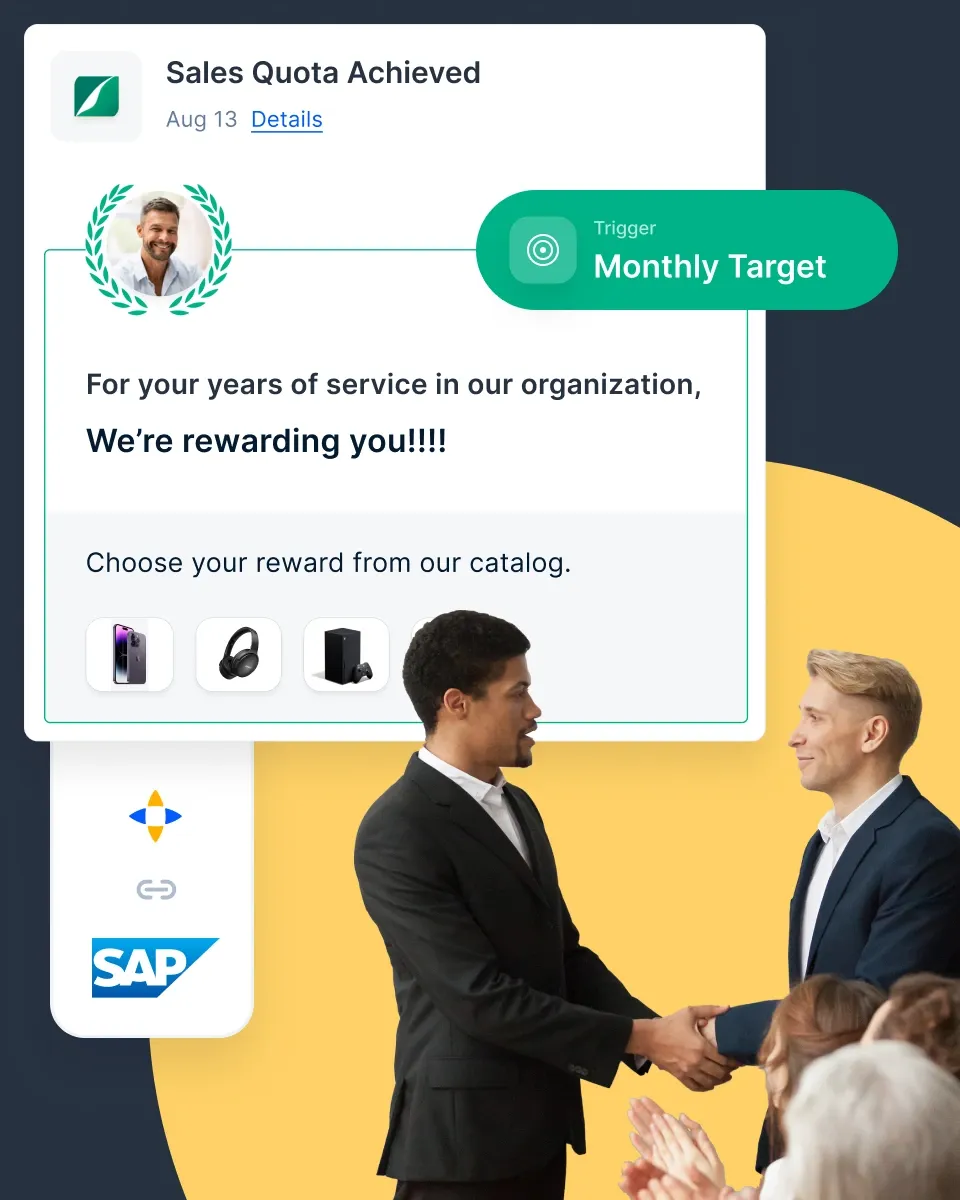80 domande di indagine sulla fidelizzazione dei dipendenti per migliorare il coinvolgimento e ridurre il turnover
42 Ottime domande per il sondaggio sulla fidelizzazione dei dipendenti che potete utilizzare per comprendere meglio i sentimenti dei vostri dipendenti e identificare le aree di miglioramento.
In questa pagina
- Che cos'è un sondaggio sulla fidelizzazione dei dipendenti?
- Perché è importante condurre indagini sulla fidelizzazione dei dipendenti?
- L'importanza di porre le giuste domande per la fidelizzazione dei dipendenti
- 80 Esempio di domande per il sondaggio sulla fidelizzazione dei dipendenti
- Come utilizzare i dati dei risultati del sondaggio sulla fidelizzazione dei dipendenti
- Le migliori pratiche di indagine sulla fidelizzazione dei dipendenti
- Migliorare la retention con Empuls: Il software di fidelizzazione dei dipendenti per il 2025
- Come empuls migliora la fidelizzazione dei dipendenti nel 2025:
- Conclusione
Trattenere i migliori talenti è fondamentale quanto attrarli. Un alto tasso di turnover può portare a perdite di produttività, a un aumento dei costi di assunzione e a un basso morale dei dipendenti. Un sondaggio ben strutturato sulla retention dei dipendenti aiuta le organizzazioni a scoprire le ragioni che stanno alla base della soddisfazione dei dipendentie impegno dei dipendenti e i potenziali rischi di turnover.
Le aziende possono ottenere informazioni sulla cultura dell'ambiente di lavoro, sull'efficacia della leadership, sulle opportunità di crescita professionale e sulla soddisfazione lavorativa ponendo le giuste domande del sondaggio sulla retention. Queste informazioni aiutano i team delle risorse umane ad affrontare in modo proattivo i problemi dei dipendenti, a migliorare le strategie di retention e a creare un ambiente di lavoro in cui i dipendenti si sentano apprezzati e motivati a rimanere.
Questa guida illustra le domande più efficaci per i sondaggi sulla fidelizzazione dei dipendenti, per aiutare le organizzazioni a capire perché i dipendenti restano e se ne vanno e come costruire un ambiente di lavoro più coinvolgente e solidale.
Che cos'è un sondaggio sulla fidelizzazione dei dipendenti?
Un sondaggio sulla fidelizzazione dei dipendenti è uno strumento di feedback strutturato progettato per comprendere i fattori che influenzano le decisioni dei dipendenti di rimanere o lasciare un'organizzazione. Aiuta i team HR e la leadership a identificare i punti di forza dell'ambiente di lavoro, i livelli di coinvolgimento e le aree da migliorare per aumentare la soddisfazione dei dipendenti e ridurre il turnover.
Queste indagini riguardano in genere le opportunità di crescita professionale, ambiente di lavorol'efficacia della leadership, la retribuzione e il riconoscimento. Conducendo regolarmente indagini sulla fidelizzazione dei dipendenti, le organizzazioni possono affrontare in modo proattivo i problemi, migliorare le strategie di fidelizzazione e promuovere una cultura in cui i dipendenti si sentano apprezzati, impegnati e motivati a rimanere.
Perché è importante condurre indagini sulla fidelizzazione dei dipendenti?
Un elevato turnover dei dipendenti può essere costoso, in quanto incide sulla produttività, sul morale e sulle spese di assunzione. Condurre un'indagine sulla retention dei dipendenti aiuta le organizzazioni a capire perché i dipendenti restano, perché se ne vanno e cosa si può fare per migliorare la retention. Senza queste informazioni, le aziende rischiano di perdere talenti preziosi a causa di problemi evitabili sul posto di lavoro.
Ecco perché i sondaggi sulla fidelizzazione dei dipendenti sono essenziali:
- Identifica i rischi di turnover: Scopre fattori come il carico di lavoro, la retribuzione, la crescita professionale o i problemi di leadership che possono portare all'insoddisfazione dei dipendenti.
- Migliora il coinvolgimento e la soddisfazione sul lavoro: Fornisce una visione chiara di ciò che motiva i dipendenti a rimanere e di come migliorare la loro esperienza.
- Rafforza la cultura dell'ambiente di lavoro: Aiuta le aziende a creare un ambiente in cui i dipendenti si sentono apprezzati, sostenuti e allineati con gli obiettivi aziendali.
- Riduzione dei costi diassunzione e formazione: Trattenere i dipendenti significa ridurre le spese di assunzione e avere team più esperti che guidano il successo dell'azienda.
- Incoraggia strategie HR proattive: Consente alle organizzazioni di affrontare i potenziali problemi di retention prima che si aggravino, garantendo la stabilità della forza lavoro a lungo termine.
Raccogliendo regolarmente feedback sulla retention, le aziende possono prendere decisioni informate che aumentano la fedeltà dei dipendenti, la soddisfazione sul lavoro e riducono al minimo le interruzioni legate al turnover.
L'importanza di porre le giuste domande per la fidelizzazione dei dipendenti
Un sondaggio sulla fidelizzazione dei dipendenti è efficace solo quanto le domande che pone. Domande generiche o vaghe possono non riuscire a scoprire le vere ragioni che stanno alla base dell'insoddisfazione e del turnover dei dipendenti, con la conseguenza di perdere opportunità di miglioramento. Per ottenere informazioni significative, le organizzazioni devono porre domande mirate e ben strutturate che affrontino i fattori chiave che influenzano la retention.
Ecco perché fare le domande giuste è importante:
- Individua i fattori specifici di retention: Aiuta a identificare gli elementi che mantengono i dipendenti impegnati, come la crescita della carriera, il supporto della leadership o l'equilibrio tra vita privata e vita lavorativa.
- Scopre problemi nascosti sul posto di lavoro: Portare alla luce problemi relativi al carico di lavoro, al riconoscimento, alla retribuzione o alla cultura aziendale. cultura aziendale che potrebbero spingere i dipendenti ad andarsene.
- Incoraggia un feedback onesto: Domande ben formulate creano uno spazio sicuro in cui i dipendenti possono condividere le proprie esperienze e preoccupazioni.
- Supporta il processo decisionale basato sui dati: Fornisce informazioni utili per aiutare i team delle risorse umane a implementare strategie di retention mirate, anziché formulare ipotesi.
- Rafforza la fiducia dei dipendenti: Dimostra ai dipendenti che la loro voce conta, aumentando l'impegno e la fedeltà quando vedono miglioramenti reali basati sul feedback.
Ponendo domande chiare, pertinenti e strategiche, le organizzazioni possono comprendere meglio le esigenze dei dipendenti, affrontare le sfide in modo proattivo e creare un ambiente di lavoro che favorisca l'impegno a lungo termine.
80 Esempio di domande per il sondaggio sulla fidelizzazione dei dipendenti
Vediamo alcune eccellenti domande per il sondaggio sulla fidelizzazione dei dipendenti che potete utilizzare per capire meglio i sentimenti dei vostri dipendenti. Potete sempre modificare queste domande per adattarle alle vostre esigenze.
Domande aperte sul sondaggio sulla retention
Le domande aperte permettono ai dipendenti di condividere i loro pensieri in modo dettagliato, aiutando le organizzazioni a scoprire informazioni più profonde sulla soddisfazione del posto di lavoro, sul coinvolgimento e sui motivi per cui i dipendenti potrebbero pensare di lasciare il posto. Queste risposte possono fornire un feedback qualitativo che le domande strutturate potrebbero non cogliere.
- Cosa le piace di più del lavoro in questa azienda?
- Qual è la sfida più grande che deve affrontare nel suo ruolo?
- Se potesse cambiare una cosa del suo lavoro, quale sarebbe?
- Cosa la spinge a rimanere in questa azienda?
- Quali aspetti del vostro lavoro vi fanno sentire apprezzati?
- Ha mai pensato di lasciare l'azienda? Se sì, perché?
- Quali miglioramenti renderebbero più piacevole la vostra esperienza lavorativa?
- Quanto pensate che le vostre competenze siano utilizzate nel vostro ruolo?
- Quali sono i fattori che vi renderebbero più propensi a rimanere con l'azienda a lungo termine?
- Come giudica la sua crescita professionale complessiva all'interno dell'organizzazione?
Domande del sondaggio sulla fidelizzazione dei dipendenti con scala da 1 a 10
Queste domande chiedono ai dipendenti di valutare le loro esperienze su una scala da 1 (minimo) a 10 (massimo). Questo formato aiuta a misurare numericamente il sentimento dei dipendenti, rendendo più facile tracciare le tendenze e confrontare i dati nel tempo.
- Quanto è soddisfatto della sua esperienza lavorativa complessiva?
- Quanto è probabile che raccomandiate questa azienda come un ottimo posto di lavoro?
- Quanto vi sentite valorizzati nel vostro ruolo?
- Quanto le responsabilità del vostro lavoro sono in linea con le vostre aspettative?
- Come giudica il suo equilibrio tra lavoro e vita privata?
- Quanto efficacemente i dirigenti riconoscono e apprezzano i vostri contributi?
- Quanto siete soddisfatti delle vostre attuali opportunità di crescita professionale?
- Quanto pensa che la leadership sia in grado di supportare i dipendenti?
- Quanto siete motivati ad andare oltre nel vostro ruolo?
- Quanto è probabile che rimanga in azienda nei prossimi due anni?
Domande del sondaggio sulla fidelizzazione dei dipendenti su scala Likert
Le domande su scala Likert consentono ai dipendenti di esprimere il proprio accordo o disaccordo con affermazioni specifiche, in genere su una scala da "Fortemente in disaccordo" a "Fortemente d'accordo". Queste domande aiutano a valutare i livelli complessivi di soddisfazione e impegno sul lavoro.
- Mi sento valorizzato e apprezzato per il lavoro che svolgo.
- Il mio manager fornisce un feedback costruttivo che mi aiuta a crescere nel mio ruolo.
- Ho un chiaro percorso di carriera e opportunità di sviluppo all'interno dell'azienda.
- La cultura aziendale favorisce la collaborazione e il lavoro di squadra.
- Ricevo un riconoscimento adeguato per i miei contributi.
- Mi sento a mio agio nell'esprimere le mie preoccupazioni al mio manager o alla leadership.
- I benefit e i vantaggi offerti dall'azienda soddisfano le mie esigenze.
- Il mio carico di lavoro è gestibile e riesco a mantenere un sano equilibrio tra lavoro e vita privata.
- Vedo un futuro a lungo termine in questa azienda.
- L'azienda intraprende azioni significative sulla base del feedback dei dipendenti.
Domande del sondaggio sulla crescita e lo sviluppo della carriera
La mancanza di progressione di carriera è una ragione comune per cui i dipendenti lasciano l'azienda. Queste domande aiutano a valutare se i dipendenti vedono opportunità di crescita professionale e di sviluppo delle competenze all'interno dell'azienda.
- Ritiene di avere opportunità di avanzamento di carriera all'interno dell'azienda?
- Ha ricevuto opportunità di sviluppo delle competenze o di formazione nell'ultimo anno?
- Il vostro manager sostiene la vostra crescita professionale e il vostro sviluppo?
- Siete soddisfatti delle opportunità di mentorship e coaching a vostra disposizione?
- Ritiene che l'azienda investa nello sviluppo della carriera a lungo termine dei suoi dipendenti?
- Ha discusso dell'avanzamento di carriera con il suo manager negli ultimi sei mesi?
- Vi sentite incoraggiati a candidarvi per le promozioni interne?
- Quale formazione o risorsa aggiuntiva vi aiuterebbe a crescere nel vostro ruolo?
- Ritiene che il suo lavoro attuale sia in linea con i suoi obiettivi di carriera a lungo termine?
- Quanto è soddisfatto delle opportunità di apprendimento e sviluppo in questa azienda?
Domande di indagine sulla cultura dell'ambiente di lavoro e sulla soddisfazione lavorativa
Una solida cultura aziendale contribuisce a migliorare la fidelizzazione dei dipendenti promuovendo un ambiente di lavoro positivo, inclusivo e di supporto. Queste domande valutano il grado di connessione dei dipendenti con la cultura aziendale.
- Sentite un senso di appartenenza in questa azienda?
- La cultura aziendale è in linea con i vostri valori personali?
- Sentite che il vostro contributo lavorativo ha un impatto significativo?
- Quanto vi sentite a vostro agio nel condividere feedback e idee con la leadership?
- Le politiche e i valori aziendali sono applicati in modo coerente in tutti i reparti?
- Vi sentite rispettati e inclusi nelle discussioni e nel processo decisionale del team?
- La collaborazione sul posto di lavoro è incoraggiata e sostenuta?
- Vi sentite psicologicamente sicuri al lavoro?
- In che misura la leadership comunica gli obiettivi e gli aggiornamenti dell'azienda?
- Descriverebbe la cultura dell'ambiente di lavoro come positiva e solidale?
Domande dell'indagine su retribuzione e benefit
Lo stipendio e i benefit sono fattori critici che influenzano la fidelizzazione dei dipendenti. Queste domande aiutano a valutare l'opinione dei dipendenti in merito alla retribuzione, ai vantaggi e al pacchetto retributivo complessivo.
- Ritiene che il suo stipendio sia competitivo rispetto agli standard del settore?
- Siete soddisfatti del pacchetto di benefit dell'azienda?
- Ritenete che la vostra retribuzione rifletta le vostre competenze e i vostri contributi?
- Quanto siete soddisfatti degli aumenti o dei bonus basati sui risultati?
- Avete accesso al sostegno finanziario e agli incentivi di cui avete bisogno?
- I vantaggi e i benefici per i dipendenti sono importanti per voi?
- Come giudica l'equità delle politiche retributive dell'azienda?
- Avete mai pensato di andarvene per problemi di stipendio?
- Quali benefici o vantaggi migliorerebbero la vostra soddisfazione lavorativa complessiva?
- Ritiene che la struttura retributiva dell'azienda sia trasparente?
Domande dell'indagine sull'efficacia dei dirigenti e della leadership
Un forte rapporto con la leadership favorisce la fiducia, l'impegno e la fedeltà. Queste domande valutano se i dipendenti si sentono supportati dai loro manager e dai leader aziendali.
- Ricevete un feedback regolare e costruttivo dal vostro manager?
- Vi sentite a vostro agio nel parlare di problemi con il vostro manager?
- Il vostro manager sostiene la vostra crescita professionale e i vostri obiettivi di carriera?
- Vi sentite riconosciuti e apprezzati dalla leadership?
- Quanto efficacemente la leadership comunica gli obiettivi e la visione dell'azienda?
- I dirigenti stabiliscono aspettative chiare e forniscono indicazioni?
- Vi sentite autorizzati a prendere decisioni nel vostro ruolo?
- La leadership agisce in base ai feedback e alle preoccupazioni dei dipendenti?
- Come descriverebbe il rapporto con il suo diretto responsabile?
- Avete fiducia che i dirigenti dell'azienda prendano decisioni a vantaggio dei dipendenti?
Domande del sondaggio sull'equilibrio tra vita privata e lavoro e sullo stress lavorativo
I dipendenti che si sentono sovraccarichi di lavoro o esauriti sono più propensi ad andarsene. Queste domande valutano l'equilibrio tra lavoro e vita privata e se i dipendenti sentono di avere il supporto e la flessibilità necessari per mantenere il benessere.
- Ritiene di avere un sano equilibrio tra lavoro e vita privata?
- Quanto è gestibile il vostro attuale carico di lavoro?
- Il vostro lavoro consente una certa flessibilità quando è necessario?
- Sentite la pressione di lavorare al di fuori dell'orario normale?
- Con quale frequenza sperimenta lo stress da lavoro?
- Avete abbastanza tempo per completare i vostri compiti in modo efficiente?
- Le politiche aziendali favoriscono il benessere dei dipendenti?
- Vi sentite a vostro agio nel chiedere ferie quando necessario?
- Quanto la leadership incoraggia l'equilibrio tra lavoro e vita privata?
- Ritiene che il burnout sia un problema nel suo reparto?
Ponendo le giuste domande al sondaggio sulla fidelizzazione dei dipendenti, le organizzazioni possono ottenere informazioni preziose su ciò che determina la soddisfazione, il coinvolgimento e l'impegno a lungo termine dei dipendenti. Queste risposte aiutano i team delle risorse umane a sviluppare strategie proattive per ridurre il turnover, migliorare la cultura dell'ambiente di lavoro e aumentare il benessere dei dipendenti.
Come utilizzare i dati dei risultati del sondaggio sulla fidelizzazione dei dipendenti
La raccolta dei dati dei sondaggi sulla retention dei dipendenti è preziosa solo se le organizzazioni analizzano i feedback, identificano le tendenze e intraprendono azioni significative. Se i risultati dei sondaggi vengono ignorati, i dipendenti possono pensare che la loro voce non sia importante, con conseguente diminuzione del coinvolgimento e aumento del turnover. Ecco come utilizzare efficacemente i dati dei sondaggi per migliorare la retention:
1. Analizzare le tendenze e i modelli principali
Esaminare le risposte al sondaggio per scoprire i temi comuni a diversi reparti, ruoli e livelli di anzianità. Identificate i problemi ricorrenti, come l'insoddisfazione per la crescita professionale, le preoccupazioni per il carico di lavoro o la mancanza di riconoscimento.
2. Identificare le aree di miglioramento
Osservate le categorie del sondaggio con i voti più bassi per determinare ciò che richiede un'attenzione immediata. Che si tratti del supporto della leadership, della retribuzione o dell'equilibrio tra lavoro e vita privata, affrontare questi problemi può evitare che i dipendenti se ne vadano.
3. Condividere i risultati principali con la leadership e i manager
La trasparenza è fondamentale. Comunicate le informazioni più importanti alla leadership e ai responsabili dei reparti per assicurarvi che tutti comprendano quali sono i fattori che determinano la fidelizzazione dei dipendenti. ritenzione dei dipendenti e il turnover dei dipendenti. Fornite ai manager i passi da compiere per migliorare il coinvolgimento.
4. Sviluppare un piano d'azione per la fidelizzazione dei dipendenti
Sulla base dei risultati del sondaggio, implementare strategie di fidelizzazione mirate. Se i dipendenti lamentano la mancanza di una crescita professionale, migliorare i programmi di formazione e le promozioni interne. In caso di problemi di carico di lavoro, rivalutare la distribuzione delle mansioni e l'equilibrio del carico di lavoro.
5. Seguire e monitorare i progressi
Le indagini sulla retention dovrebbero essere un processo continuo. Conducete sondaggi o follow-up per misurare se i cambiamenti implementati stanno facendo la differenza. Mantenere i dipendenti informati su come il loro feedback ha portato a miglioramenti reali aumenta l'impegno e la fiducia.
L'utilizzo efficace dei dati dei sondaggi sulla retention dei dipendenti aiuta le aziende ad affrontare in modo proattivo i rischi di turnover, a migliorare la cultura dell'ambiente di lavoro e a costruire una forza lavoro che si senta apprezzata e impegnata.
Le migliori pratiche di indagine sulla fidelizzazione dei dipendenti
Un sondaggio sulla fidelizzazione dei dipendenti ben progettato può fornire indicazioni preziose su ciò che mantiene i dipendenti impegnati e su ciò che potrebbe spingerli ad andarsene. Tuttavia, per ottenere un feedback onesto e fattibile, le organizzazioni devono seguire le best practice, assicurando che i sondaggi siano pratici, perspicaci e attuabili.
1. Definire obiettivi chiari
Prima di creare il sondaggio, stabilite cosa volete ottenere. State cercando di capire i rischi di turnover, di migliorare l'efficacia della leadership o di migliorare la cultura dell'ambiente di lavoro? Gli obiettivi chiari aiutano a creare domande mirate che producono informazioni significative.
2. Porre il giusto mix di domande
Un sondaggio equilibrato comprende domande a risposta aperta, a scelta multipla, su scala Likert e su scala di valutazione, per acquisire informazioni sia qualitative che quantitative. Evitate le domande di tipo diretto o troppo complesse che potrebbero confondere i dipendenti.
3. Garantire l'anonimato e la riservatezza
I dipendenti sono più propensi a condividere feedback onesti se sanno che le loro risposte sono anonime e non avranno ripercussioni sulla loro sicurezza lavorativa. Comunicate come verranno utilizzati i dati per creare fiducia e incoraggiare la partecipazione.
4. Cronometrare l'indagine in modo strategico
Evitate di condurre indagini sulla retention durante periodi di forte stress, come le valutazioni delle prestazioni o i grandi cambiamenti organizzativi. Il momento migliore per condurre le indagini è trimestrale o semestrale, in modo da garantire che il feedback sia fresco e utilizzabile.
5. Promuovere la partecipazione e l'impegno
Comunicate perché il sondaggio è importante e come il feedback dei dipendenti porterà a miglioramenti reali. Incoraggiate la partecipazione di tutta l'azienda per ottenere una gamma diversificata di informazioni.
6. Analizzare e agire sui dati del sondaggio
La semplice raccolta delle risposte ai sondaggi non è sufficiente: i team delle risorse umane devono analizzare le tendenze.
La semplice raccolta delle risposte ai sondaggi non è sufficiente: i team delle risorse umane devono analizzare le tendenze, identificare i punti dolenti e agire. Utilizzate strumenti di visualizzazione dei dati per interpretare i risultati e prendere decisioni informate.
7. Attuare modifiche significative sulla base del feedback
Una volta analizzati i dati, sviluppate strategie di retention attuabili che affrontino i problemi principali. Che si tratti di migliorare il supporto della leadership, di aumentare le opportunità di crescita professionale o di perfezionare i programmi di riconoscimento, assicuratevi che i dipendenti vedano miglioramenti tangibili basati sui loro input.
8. Seguire e monitorare i progressi
Gli sforzi di mantenimento devono essere continui. Conducete sondaggi di follow-up o pulse check per misurare se i cambiamenti implementati stanno facendo la differenza e aggiustare le strategie di conseguenza.
Seguendo queste best practice, le organizzazioni possono trasformare le indagini sulla fidelizzazione dei dipendenti in potenti strumenti per ridurre il turnover, migliorare la soddisfazione sul posto di lavoro e promuovere la fedeltà a lungo termine dei dipendenti.
Migliorare la retention con Empuls: Il software di fidelizzazione dei dipendenti per il 2025

Per trattenere i migliori talenti nel 2025 non bastano solo stipendi competitivi: i dipendenti si aspettano un ambiente di lavoro positivo, opportunità di crescita professionale e riconoscimenti significativi. È qui che Il softwareEmpuls per la fidelizzazione dei dipendenti aiuta le organizzazioni a creare un ambiente di lavoro in cui i dipendenti si sentano apprezzati, coinvolti e motivati a rimanere.
Come empuls migliora la fidelizzazione dei dipendenti nel 2025:

- Approfondimenti sulla retention basati sui dati - Identificate i rischi di turnover analizzando il sentiment dei dipendenti, le tendenze di coinvolgimento e i modelli di riconoscimento.
- Sondaggi e cicli di feedback potenziati dall'intelligenza artificiale Automatizzare i sondaggi sulla fidelizzazione dei dipendenti per monitorare la soddisfazione, le aspettative di crescita professionale e le preoccupazioni sul posto di lavoro.
- Coinvolgimento e riconoscimento dei dipendenti - Rafforzare la fidelizzazione con il riconoscimento tra pari, i programmi di ricompensa e le iniziative di apprezzamento della leadership.
- Integrazione perfetta con i sistemi HR - Si connette con le piattaforme HRIS, Slack, Microsoft Teams e altro ancora per favorire una maggiore partecipazione alle iniziative di retention.
- Piani d'azione personalizzati - Generazione di strategie personalizzate di coinvolgimento dei dipendenti basate sulle risposte ai sondaggi per affrontare in modo proattivo i problemi di retention.
Con Empulsle aziende possono andare oltre i colloqui di uscita e adottare misure proattive per ridurre il turnover, migliorare la soddisfazione sul lavoro e costruire una forza lavoro impegnata a lungo termine.
Conclusione
I sondaggi sulla fidelizzazione dei dipendenti sono strumenti preziosi per le organizzazioni che vogliono migliorare la soddisfazione e il coinvolgimento dei dipendenti, ridurre lo stress sul posto di lavoroe i tassi di turnover e, in ultima analisi, migliorare i profitti.
Ponendo le domande giuste e raccogliendo i feedback dei dipendenti, le organizzazioni possono identificare le aree di miglioramento, affrontare i problemi e costruire una cultura dell'ambiente di lavoro più positiva.
È essenziale assicurarsi che le domande del sondaggio siano chiare, pertinenti e riflettano i valori e gli obiettivi dell'organizzazione. Le organizzazioni possono creare un ambiente di lavoro più produttivo, positivo e prospero per tutti dando priorità alla soddisfazione e al coinvolgimento dei dipendenti.













